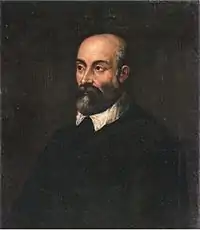Palladian
See also: palladian
English
WOTD – 19 August 2019
Pronunciation

The statue of Pallas Athena (etymology 1) in front of the Austrian Parliament Building in Vienna, Austria

A 16th- or 17th-century portrait of Italian architect Andrea Palladio (etymology 2) by Alessandro Maganza
.jpg.webp)
Palazzo Chiericati, a Renaissance palace in Vicenza, Italy, was designed by Palladio and is thus an example of Palladian architecture (etymology 2, sense 1)
- (Received Pronunciation) IPA(key): /pəˈleɪ.dɪ.ən/
- (General American) IPA(key): /pəˈleɪ.di.ən/
Audio (UK) (file) - Rhymes: -eɪdiən
- Hyphenation: Pal‧lad‧i‧an
Etymology 1
From Latin Palladius (“of or relating to Pallas”) + -an (“suffix forming adjectives from nouns”). Palladius is derived from Pallas (from Ancient Greek Παλλάς (Pallás, “epithet of Athena, the Greek goddess of wisdom”), from παλλακίς (pallakís, “concubine”), most likely from Proto-Indo-European *parikeh₂ (“concubine; wanton woman”)) + -ius (“suffix forming adjectives from nouns”).[1]
Adjective
Palladian (not comparable)
Translations
of or relating to Pallas
|
of or relating to knowledge, study, or wisdom
Etymology 2
From Italian Palladio, the surname of Andrea Palladio (1508–1580) + -an (“suffix forming adjectives from nouns”).[2]
Adjective
Palladian (not comparable)
- (architecture) In the style of the Italian neoclassical architect Andrea Palladio.
Derived terms
- Palladianism
- Palladianize
- Palladian window
Translations
in the style of the Italian neoclassical architect Andrea Palladio
|
|
Noun
Palladian (plural Palladians)
Translations
architect who designs buildings in the Palladian style
|
|
References
- Compare “Palladian, adj.1”, in OED Online

- “Palladian, adj.2 and n.”, in OED Online

Further reading


This article is issued from Wiktionary. The text is licensed under Creative Commons - Attribution - Sharealike. Additional terms may apply for the media files.